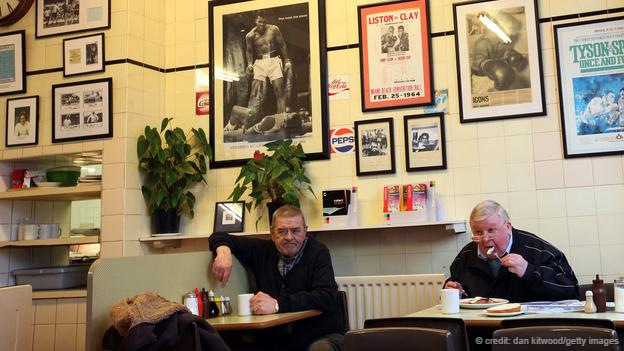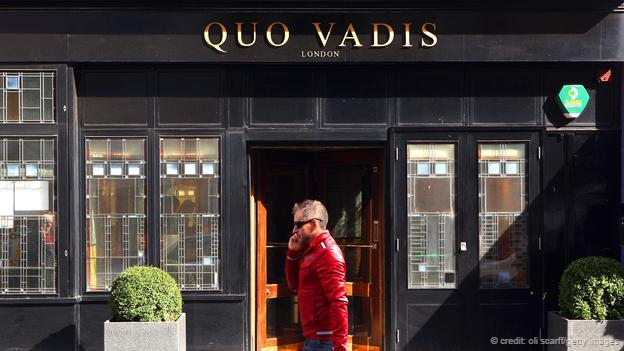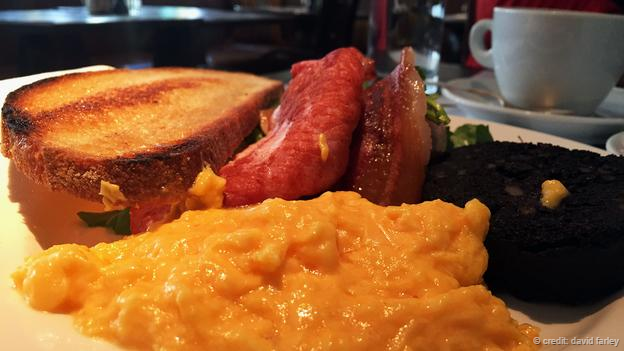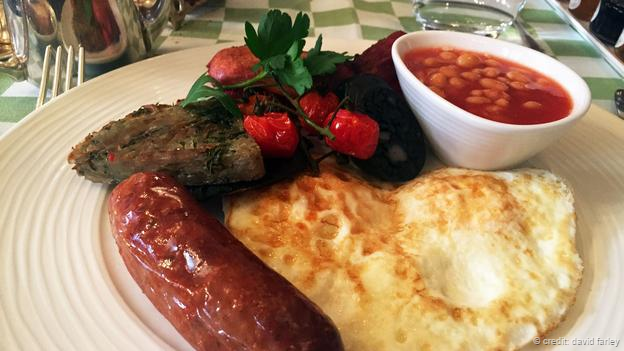英式早餐是世界第一美味早餐吗? - BBC大卫·法利(David Farley)(2023年7月14日)

英式早餐
英国戏剧家萨默塞特·毛姆(Somerset Maugham)曾说过,“要在英国吃得好,就应该一天吃三顿早餐。”
这难道是变着法儿地影射除早餐外的英国食物都令人难以下咽吗?或者说,英式早餐之美味值得让人一天吃三次而不是一次?
英式早餐含有大量胆固醇和热量,通常包括:两个鸡蛋、香肠、培根、焗豆、炸番茄和烤面包。英式早餐之丰盛可以称得上是饕餮大餐,吃一顿这样的早餐,对付再糟糕的宿醉也不在话下,吃完了就算直接扛到吃晚餐也不成问题。但要是像毛姆说的那样常常沉溺于英式早餐可是会折寿的。不过,英式早餐的忠实拥趸们坚持认为,除了在英国,在哪儿也找不到更好的早餐。
在最近的一次伦敦之行中,我想要尽情享用一下这些油煎食物(英式早餐的俗称),亲自验证英式早餐究竟是不是世界第一美味早餐,另外,对毛姆的饮食箴言也能有个深入的认识。
皮姆利科(Pimlico)附近的摄政咖啡(Regency Café)自1946年起就一直供应全套英式早餐。为完成这项颇为艰巨的任务,我招募了当地一位美食评论人——莉齐·马博特(Lizzie Mabbott),请她和我一起,冒着动脉硬化的危险,完成这次美食品鉴大冒险。
当我们走进咖啡厅时,正好有一个眼圈黑黑的家伙大步走出去,胳膊下夹着份报纸,这不禁让我对自己是否真的要吃下整份早餐感到有些怀疑。马博特和我排着队研究吧台后黑板上的菜单:全套早餐包括鸡蛋、培根、香肠、焗豆或番茄、面包或吐司、咖啡或茶。价格总共是5.50英镑。再加一点儿钱, 还能外加炸土豆饼、黑布丁(装有小块猪油的血肠)以及“叽叽咕咕”(一种卷心菜土豆馅饼)。

在摄政咖啡(Regency Café)享用早餐(图片来源:Dan Kitwood/Getty Images)
咖啡厅的内部装修很简单:塑料贴面桌子,塑料椅子,墙壁上涂有拳击纪念图片。吧台后优雅的女服务生大声报着订单:“番茄套餐!焗豆套餐加炸薯条!”我们也点了餐,我点了有黑布丁套餐外加“叽叽咕咕”。
在等待上菜时,马博特告诉我她对油煎食物的个人吃法原则。“布朗沙司和番茄酱味道截然不同, 我会在香肠上涂布朗沙司,在其他油煎食物上都涂番茄酱。”马博特又补充道,“但这还不够,我不喜欢蛋黄沾上番茄,有这样抱怨的人还真不少见。”
马博特没错,她不是惟一有油煎食物原则的人。
在 BBC TV 长期栏目艾伦秀(“I’m Alan Partridge”)中,演员史蒂夫·库根(Steve Coogan)就曾表示,上菜时煎蛋和焗豆应分开。在节目中,他的俄罗斯女友为他做传统英式早餐。库根表示,“也许我会把它们混起来吃,但我希望这是我自己决定的。”
尽管这有些可笑,但却是实话。对细节特别挑剔的人并不少见,就像这次我餐桌对面的人。
马博特催促我研究香肠,她认为只有香肠才能反映出早餐的整体质量。她说,“香肠做得好,盘子中的其他东西应该就没什么问题了。”摄政咖啡的香肠好得出奇:对这样一家不怎么在乎食品健康意识的餐厅而言,其香肠不仅新鲜多汁,而且经济实惠。整体而言,早餐好得超出我的预期。不足之处是,黑布丁有些干。另外,酸酸的番茄也帮我化解了培根的油腻。“叽叽咕咕”(夹着几片卷心菜的半软土豆饼)虽有些乏味,但却也吸收了溏心煎蛋稀溜溜的蛋黄。

伦敦苏活区(Soho)的 Quo Vadis 餐厅 (图片来源:Oli Scarff/Getty Images)
据英式早餐协会(The English Breakfast Society)(一家伦敦非营利组织,“致力于维护全英式早餐的历史和传承”)称,煎炸食物还要追溯到19世纪初,当时,英国乡村贵族在狩猎前或者休闲和阅读之前,往往喜欢享用一顿丰盛的早餐。此后,随着19世纪中产阶级的出现,越来越多的英国人开始模仿富人的生活方式,全套英式早餐就是其中一个方面。在认识到一顿丰盛的早餐是一天繁重生活的良好开端之后,工人阶级很快也加入其中。到1950年代,煎炸食物已经成为英国的国民早餐。
鉴于英式早餐的贵族血统,我也想要尝试一下高端英式早餐的滋味。根据伦敦美食家(Food Lovers London)的作者、伦敦美食评论人詹妮·林福德(Jenny Linford)建议,伦敦苏活区(Soho)的Quo Vadis餐厅就供应这样的高端美食。这家高档餐厅主要提供现代英伦美食。
这家餐厅里静谧的气氛给人的感觉像是来到了酒店的大堂或者是沉闷的俱乐部一样。这里全套早餐价格高达12英镑,除了不包括焗豆外,其他与我先前体验过的英式早餐也没有什么不同。林福德表示,“这种豪华早餐最大的不同点是,食材质量要好很多。”

豪华早餐
其中包括:与摄政咖啡干干的黑布丁不同,Quo Vadis餐厅的布丁外脆里糯。培根也更为多汁和鲜嫩。煎蛋则是明亮的橘黄色。
林福德说,“我建议来这里的原因在于,它能体现英伦美食的若干发展趋势,这在盘子中就已一览无余。”她补充说,“优质美食基本上要在悠闲的环境里享用,并且要用本地应时的食材制作。过去,你很可能必须去酒店才能享用到优质的全套英式早餐。现在的情况可不是这样的了。”
在伦敦逗留的最后一天,在所住的南肯辛顿区(South Kensington)里程碑酒店(Milestone Hotel),我信步前往早餐区,看到了一份全套英式早餐菜单。我有点儿不情愿地点餐:这已经是我一连第三天吃这样容易导致动脉硬化的食物了。酒店的英式早餐值得一试吗?我决定试一试再说。

里程碑酒店的英式早餐 (Credit: David Farley)
幸亏我这么做了。这里供应的早餐包括:两种培根(都是外脊和五花培根),焗豆,可口的“叽叽咕咕”,松软香糯的黑布丁,表皮紧实、内里多汁的香肠,还有完美的溏心煎蛋。实际上,在我试吃的三次早餐中,这次是我的最爱。价格虽然不便宜,要25英镑,但味道极好,就好像取自上好的食材一样。实在是物有所值啊。
在吃过这么多英式早餐后,我想知道的是自己能否平安返回纽约:我该不会在大西洋上空心脏病发作吧。但我的确对毛姆的妙语有了更深入的认识。毛姆于1965年离世,他要是活到现在,对英国食物的现状也应该感到满意,因为现在比那时候可要好出太多了。但我认为,毛姆必须说些赞美英式早餐的话,他也不会去攻击英国美食。如果不是担心热量和胆固醇太高,英式早餐真的是值得一天吃三顿的。
(责编:路西)
Does England make the world’s most delicious breakfast? - By David Farley
British playwright Somerset Maugham once said that “to eat well in England you should eat breakfast three times a day”.
Was this a witty way of saying that, save for breakfast, the food in England was inedible – or that the English breakfast is so superior that it’s worth eating not once but thrice daily?
The English breakfast is a cholesterol-laden calorie bomb usually consisting of two eggs, sausage, bacon, baked beans, fried tomato and toast. It’s a symphony of deliciousness on a plate, enough to ward off the worst hangover and fill you up until dinnertime. Indulge in it as often as Maugham suggested and it could take years off your life. But devotees insist you can’t find a better breakfast anywhere.
On a recent trip to London, I wanted to indulge in a few of these fry ups (as the meal is colloquially referred) to decide for myself whether this was the world’s best breakfast – and, by extension, how to interpret Maugham’s dining admonition.
Regency Cafe, in the Pimlico neighborhood, has been slinging up the full English breakfast since 1946. I recruited local food writer Lizzie Mabbott for the artery-hardening task of helping me decipher the dish.
As we walked in, a guy with a fresh black eye strode out, newspaper under his arm, making me wonder if I, too, was going to have to do battle to eat the entire meal. Mabbott and I got in line and studied the chalkboard behind the counter: the set breakfast consisted of egg, bacon, sausage, beans or tomatoes, bread or toast, coffee or tea. All for £5.50. For a small additional fee you could also order hash browns, black pudding (blood sausage stuffed with small chunks of lard) and bubble and squeak (a sort of potato cake with cabbage).
The cafe’s interior was simple: Formica tables, plastic chairs and walls plastered with boxing memorabilia. A dainty woman behind the counter barked orders in a booming voice: “Set tomato! Set beans with chips!” We ordered, and I got the set with black pudding and bubble and squeak.
As we waited, Mabbott let me in on her own personal fry-up rules. “Hotly contested is the brown-sauce-versus-tomato-sauce debate. I put brown sauce on the sausage and tomato sauce on anything that’s fried.” That wasn’t all, though. “I don’t like my egg yolk touching my tomato,” she said, adding, “and that’s not an uncommon complaint.”
According to I’m Alan Partridge, the long-running BBC TV show featuring actor Steve Coogan, the eggs and beans should be separate when served. “I may want to mix them, but I want that to by my decision,” Coogan said on an episode in which his Russian girlfriend makes him a traditional English breakfast. “And use the sausage,” he added, “as a breakwater.”
It’s funny because it’s true. Not every lover of the full English has such strict rules, but it’s not uncommon to be sitting across the table from someone, as I was this time, who is very finicky about the details.
Mabbott urged me to study the sausage, which she said indicates the overall quality of the breakfast. “If the sausage is good,” she said, “then everything else on the plate should be good, too.” The sausage at the Regency Café was surprisingly good – juicy and fresh tasting for a no-frills neighborhood restaurant that serves up not-so-health-conscious fare. Overall, the breakfast was better than I expected. The black pudding was a tad dry. The tomato’s acidity helped cut the bacon grease. And the bubble and squeak – a brick of semi-soft potatoes with the occasional piece of cabbage thrown in – was dull but soaked up the runny egg yolk.
According to the The English Breakfast Society, a London-based non-profit group “dedicated to the history, tradition and heritage of the full English breakfast”, the fry up dates back to the early 19th Century, when the landed gentry would partake in a large breakfast before going hunting, or while relaxing and reading. Later that century, as a middle class emerged, more English citizens began to emulate the wealthy – and one way was to partake in the full English. The working class soon got in on it, too, realising that a hearty breakfast was a good way to start a day of energy-sapping labour. By the 1950s, the fry up had become the national breakfast.
Given the breakfast’s blue-blooded origins, I wanted to try an upmarket version. London-based food writer Jenny Linford, author of Food Lovers London, suggested Quo Vadis in Soho, an upscale restaurant that focuses on modern British cuisine.
The quiet interior felt like a stuffy club or hotel lobby. The full breakfast here cost a whopping £12, and except for the absence of baked beans, there was nothing that looked too different from my previous English breakfast. “With a posh version like this,” Linford said, “the main difference is that the quality of the ingredients is going to be better.”
And they were: unlike the dry black pudding at the Regency Cafe, Quo Vadis’ version was crispy on the outside and gooey on the inside. The bacon was tender and juicy. The eggs had a bright orange-yellow hue.
“I suggested this place because it represents several trends in British dining that we can see right on the plate,” Linford said. “High quality food with little fuss in a casual environment and ingredients that are in season and local.” In the past,” she added, “you would have probably had to go to a hotel to get a really high-quality full English. Not anymore.”
On my last day in London, I wandered down to the breakfast area of the Milestone Hotel in South Kensington, where I was staying, and saw the full English on the menu. I was a tad reluctant to order it: this would be my third morning in a row spent eating the artery-hardening dish. Would a hotel version be worth it? I decided to try it.
Thank goodness I did. It came with two kinds of bacon (both back and streaky bacon), baked beans, a flavourful bubble and squeak, gooey black pudding, a sausage that had a taut outer casing and a juicy interior, and perfectly runny eggs. In fact, of the three breakfasts I tried, this was my favourite. It wasn’t cheap at £25, but it tasted as though it was prepared with the highest quality ingredients. It was worth every calorie.
After eating so many English breakfasts, I wondered if I was going to make it back to New York without having cardiac arrest over the Atlantic. But I had more insight into Maugham’s colourful quip. Certainly he’d be pleased with the current state of English food, which, by all accounts, is leaps and bounds better than it was when he left us in 1965. But also, I decided, Maugham had to be speaking in praise of the English breakfast, not against British cuisine. If calories and cholesterol weren’t a concern, the English breakfast really would be worth eating three times per day.